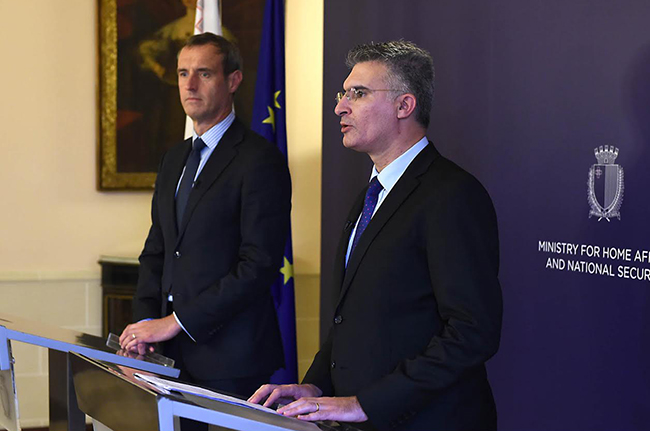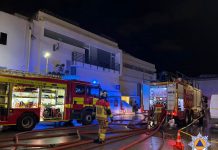During its upcoming EU Presidency, Malta will work on the launching of the new EU Policy Cycle on the fight against organised crime, covering the period 2017-2020, following an assessement of the current organised-crime situation carried out by Europol, said Minister for Home Affairs and National Security Carmelo Abela.
He was addressing a press conference with Europol Director Rob Wainwright at the Police Headquarters in Floriana, following a meeting between the two sides where views were exchanged on dossiers related to security, as part of the final preparations for Malta’s upcoming Presidency of the Council of the EU.
Minister Abela noted that the new EU Policy Cycle will continue building on the present EU policy cycle launched six years ago for the period 2013-2017. This was aimed at enhancing the fight against serious international crime and organised crime, while strengthening effective cooperation and robust operational action, targeting the most pressing criminal threats. The policy cycle was based on a set of priorities, and Malta participates in five of these operations, including on illegal immigration, drugs, card fraud, and child sexual exploitation as part of the fight against cybercrime.
The Minister remarked that Police cooperation between Member States to combat organised crime will remain a priority. He stated that in a time where crime has become borderless, efforts must also be transnational, and coordination has to go across borders. “In these challenging and complex times, we need to keep on working on a strategy for safety for the benefit of all European citizens”, he said.
Mr Wainwright spoke about the excellent cooperation that exists between the Malta Police Force and EUROPOL, and expressed optimism at further strengthening the existing relationship even futher.
“It is very good to see the emphasis that the Maltese Presidency will place on internal security and on continuing to enhance police cooperation. I was pleased to hear from the Minister, in our meeting, that he wants to bring the EU closer to the public in the area of internal security, and we are determined – in the course of the Maltese Presidency and beyond – to see that Euopol acts as an efficient centre for information exchange and Police cooperation in the fight against terrorism, people smuggling and cybercrime, especially,” said Mr Wainwright.
He added that, “In all these areas Europol is working hard to connect communities across Europe in the daily exchange of thousands of intelligence messages about the ongoing activities of the most dangerous criminal terrorist organisations in Europe. We are helping to support thousands of hotspot operations each year, most notably in the last year to support the investigations of the terrible attacks that happened in Paris and other locations. Terrorism is a top political priority in the EU and Europol is playing its part in helping to create a safer Europe”.
The Malta Police Force has a Europol National Unit, serving as the point for exchange of information between Europol and other National Units and law enforcement bodies in Malta. It gathers, analyses and disseminates information. All information sent and received by this office is transmitted through the Maltese Europol Liaison Officer, based at the Europol headquarters in The Hague.
In addition, this month the Malta Police has officially announced its participation in the Counter Terrorism Joint Liason Team at Europol, with the secondment of a Liaison Officer from the Police Counter Terrorism Unit. The Joint Liaison Team drives intelligence-led coordinated action against terrorist threats.
Furthermore, in response to the newly launched 24/7 activities at Europol’s Operational Centre, the Malta Police Corps has embarked on work aimed at strengthening the National Unit so as to support Europol round the clock. In recent weeks, the Police has also recruited officers to join the National Unit. These officers have been trained in the handling of tools for direct exchange and response.










